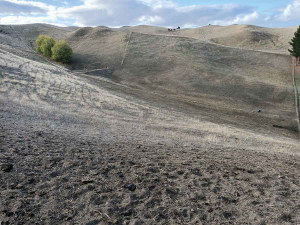Government Declares Medium-Scale Adverse Weather Event in Bay of Plenty, Gisborne/Tairāwhiti, and Canterbury
Recent weather events in the Bay of Plenty, Gisborne/Tairawhiti, and Canterbury have been declared a medium-scale adverse event.
 Hawkes Bay farmers are likely to encounter animal health and welfare issues soon as try to cope with the effects of what is believed to be the region’s worst ever drought.
Hawkes Bay farmers are likely to encounter animal health and welfare issues soon as try to cope with the effects of what is believed to be the region’s worst ever drought.
Animal health and welfare issues are likely to emerge soon as Hawkes Bay farmers try to cope with the effects of what is believed to be the worst drought in the history of the region.
Richard Hilson, managing director of Vet Services Hawkes Bay, told Rural News his worry is what will happen to the huge number of skinny animals in the region come winter. He says despite farmers’ best efforts to feed their stock, there are lots of light animals around and they will come under pressure when the winter sets in.
Hilson is also a farmer in his own right with 800 deer, 550 ewes and some cattle.
He says he’s been spending between $12,000 and $15,000 a month to feed his stock during the drought.
Hilson says the picture in the region is grim.
“The ewes were going backwards at the start of mating because no one had any tucker and so we would expect fewer twins and triplets and more empties. Wool quality will also be [affected] and they’ll have no capacity to handle potential stress,” he says.
“When winter comes you have large numbers of animals in lighter condition that aren’t carrying the fat that keeps them warm when it gets cold. They will also be more susceptible worms and lice.”
Hilson says his veterinary practice will be scanning about 15% fewer sheep this year because of the drought. He says hoggets account for about half of this number and notes while the number of actual flocks have remained the same, farmers have sold some of their capital stock.
“Some pretty drastic calls have been made. One stock agent told me he’s had 200 cows booked into the works every week for the past month,” he told Rural News.
“The number accounts for the loss of about seven breeding cow herds in Central Hawkes Bay, given that the average size of a breeding herd here is about 130 mixed aged cows.”
Hilson says he takes his hat off to the way that farmers in the region have handled the drought. He says some have had to sell animals for $50 each, whereas in a normal season these would fetch $150. He says many farmers are just haemorrhaging money to feed their stock and are taking a huge hit.
“They really care about their stock and are not worrying about themselves. They are out there every day doing their best for their animals and at this moment they “don’t gave a rat’s arse” about Covid-19, he says.
Hilson says while the lockdown might have been bad for people in Wellington, the farmers in Hawkes Bay have taken a massive hit. He says many are gutted with the Government’s response to the drought.
“I wrote a letter to David Parker and Damien O’Connor and asking them to make sure that MPI shows a bit of compassion around the drought because there is no doubt there is going to be some welfare issues and maybe there will be some neglect,” he says.
The Real Estate Institute of New Zealand (REINZ) has released its latest rural property report, providing a detailed view of New Zealand’s rural real estate market for the 12 months ending December 2025.
Rural retailer Farmlands has released it's latest round of half-year results, labeling it as evidence that its five-year strategy is delivering on financial performance and better value for members.
OPINION: "We are back to where we were a year ago," according to a leading banking analyst in the UK, referring to US president Donald Trump's latest imposition of a global 10% tariff on all exports into the US.
DairyNZ says the Government’s proposed Resource Management Act reform needs further work to ensure it delivers on its intent.
Overseas Trade Minister Todd McClay says he's working constructively with the Labour Party in the hope they will endorse the free trade agreement (FTA) with India when the agreement comes before Parliament for ratification.
Donald Trump's latest tariff tantrum has again thrown the world of trade into a new round of turmoil and uncertainty, and NZ is caught up in it.